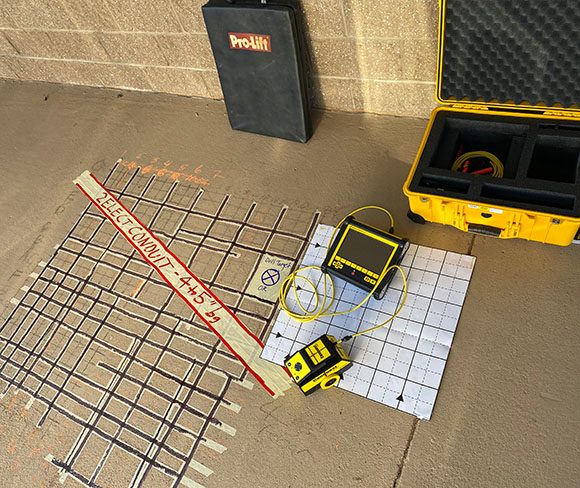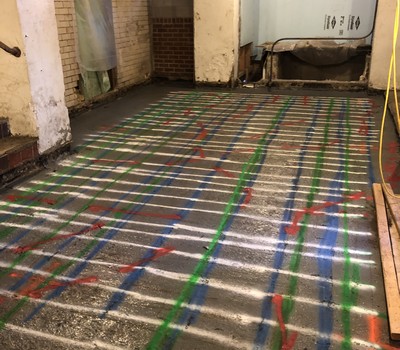Discovering the Secret Advantages of Concrete Scanning in Building Projects
In the realm of modern building and construction practices, the application of concrete scanning technology has become a pivotal device for making certain task effectiveness and structural stability. From improving precaution to properly detecting energies hidden below the surface area, the benefits of concrete scanning are complex. The capability to streamline task timelines and reduce prices while protecting existing frameworks is a testimony to the value this modern technology offers the construction sector. As we explore the nuanced advantages of concrete scanning, it becomes noticeable that its effect prolongs much beyond surface-level assessments, using a glimpse into the complex web of advantages waiting to be uncovered.
Boosted Safety And Security Measures
Using innovative concrete scanning modern technology enhances precaution on construction websites by offering precise detection of potential dangers concealed under the surface. This modern technology makes it possible for building and construction teams to recognize rebar, avenues, post-tension wires, and various other obstructions prior to excavation or exploration, significantly minimizing the danger of mishaps. By identifying these components specifically, employees can avoid harmful important architectural components, therefore avoiding injuries, delays, and pricey repairs.
Moreover, concrete scanning plays an essential duty in guaranteeing the integrity of existing frameworks during developments or improvements. By detecting weak points, spaces, or damage within concrete components, designers can deal with these problems proactively, improving the overall safety and security and durability of the structure. This proactive strategy not just minimizes the danger of structural failures however also decreases the possibility for crashes triggered by unforeseen architectural shortages.
Fundamentally, the application of concrete scanning modern technology acts as a positive precaution that safeguards both building employees and the structural honesty of structures, ultimately adding to the total success and performance of building tasks. - RainierGPR Concrete Scanning
Accurate Detection of Utilities
Concrete scanning technology assists in exact identification of below ground utilities, enhancing construction site safety and security and effectiveness. Precise discovery of utilities is vital in building and construction projects to stop pricey damages, project delays, and most significantly, make sure the safety and security of workers and the public. By making use of sophisticated scanning innovations such as ground-penetrating radar (GPR) and electro-magnetic induction, building groups can map out the location of buried pipes, cable televisions, and other utilities with high degrees of precision.

Time and Expense Effectiveness

Concrete scanning technology allows construction groups to accurately locate rebar, post-tension cords, and various other embedded items within concrete structures. This accurate details helps in avoiding expensive blunders such as accidental damages to essential elements during exploration, cutting, or coring tasks. Additionally, by link determining prospective risks beforehand, the requirement for costly fixings or revamp because of problems can be decreased, leading to set you back financial savings for the task.

Additionally, the capacity to swiftly and precisely find energies underneath the surface area without creating any kind of damage not just conserves time yet also protects against expensive interruptions to existing framework. On the whole, the moment and cost efficiency benefits of concrete scanning make it an important device for improving building job management and implementation.
Conservation of Architectural Honesty
Maintaining the architectural honesty of structures and framework is vital in guaranteeing long-lasting stability and security. Concrete scanning plays an important role in this preservation process by allowing building and construction experts to recognize possible risks to the structural integrity of a structure or infrastructure before they rise into major concerns. With the use of innovative scanning technologies such as ground-penetrating radar (GPR) and electro-magnetic induction, building and construction groups can non-invasively analyze the problem of concrete frameworks, locate rebar, post-tension wires, and other embedded elements, and recognize any type of gaps, cracks, or damage within the concrete.
Improved Job Preparation
In order to guarantee the effective implementation of building and construction tasks, precise focus to information and complete preparation are necessary components that stem from a comprehensive understanding of the structural conditions determined via concrete scanning. Inevitably, including concrete scanning right into the job preparation stage boosts control amongst team participants, cultivates positive analytic, and contributes to the successful distribution of building and construction jobs within budget plan and schedule restraints.
Verdict
Finally, concrete scanning uses countless advantages in construction tasks. By enhancing precaution, properly finding utilities, improving time original site and cost performance, protecting architectural stability, and aiding in task planning, concrete scanning verifies to be an essential device for successful task execution. Its pop over here ability to minimize dangers, increase performance, and make certain job integrity makes it an indispensable possession for building specialists.
In the realm of modern-day building and construction techniques, the usage of concrete scanning modern technology has arised as a crucial tool for making certain project efficiency and structural stability.Concrete scanning technology allows building and construction groups to accurately find rebar, post-tension wires, and other ingrained things within concrete frameworks. Through the use of advanced scanning technologies such as ground-penetrating radar (GPR) and electromagnetic induction, building groups can non-invasively examine the condition of concrete structures, find rebar, post-tension wires, and various other embedded components, and recognize any voids, cracks, or damage within the concrete.
In order to guarantee the successful implementation of building tasks, meticulous attention to detail and comprehensive preparation are important elements that stem from a detailed understanding of the structural problems determined with concrete scanning. Inevitably, including concrete scanning into the task preparation stage boosts control among team members, fosters proactive analytical, and adds to the effective shipment of construction jobs within budget plan and routine restrictions.
Comments on “The Benefits of RainierGPR Concrete Scanning for Construction Projects”